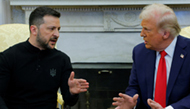Europeans Struggling With Carbon Markets

Under Europe’s system of carbon limits, factory emissions have risen.
By JAMES KANTERBRUSSELS - Practical experience with carbon markets in the European Union raises a critical question: Will such systems ever work?
Backers of these markets, which involve setting limits on greenhouse gases and then allowing companies to buy and sell emission permits, see the approach as one of the cheapest and most effective ways to control the gases in advanced economies.
Yet in Europe, which created the world’s largest greenhouse gas market three years ago, early evidence suggests the whole approach could fail. Carbon dioxide emissions are still rising in many industries, not falling.
“We currently are in danger of losing yet another decade in the fight against global warming,” said Hugo Robinson of Open Europe, a research group in London. In May, the European Environment Agency reported that emissions from factories and plants that trade pollution permits had risen 0.4 percent in 2006 over the previous year, and 0.7 percent in 2007, the first two years under the system.
Europeans took an early lead in efforts to curb global warming, championing the Kyoto Protocol and imposing a market-based system in 2005 to cap emissions from about 12,000 factories producing electricity, glass, steel, cement, pulp and paper. Companies buy or sell permits based on whether they overshoot or come in beneath their pollution goals.
European Union officials acknowledge that establishing such a vast market has been more complicated than they expected.
“Of course it was ambitious to set up a market for something you can’t see and to expect to see immediate changes in behavior,” said Jacqueline McGlade, the executive director of the European Environment Agency. “It’s easy, with hindsight, to say we could have been tougher.”
A major stumbling block arose at the outset, when some governments allocated too many trading permits to polluters when the market was created. That led to a near-market failure after the value of the permits fell by half, and called into question the validity of the system.
Since then, officials have promised changes, and the price of carbon permits has largely recovered. Yet a ferocious lobbying battle is under way as European Union regulators seek to overhaul dysfunctional parts of the market by charging polluting companies more and reducing the supply of permits. Brussels is also seeking to consolidate its oversight of the market, rather than leave it partly in the hands of national governments that have proved susceptible to corporate lobbying.
Electricity producers, oil and steel companies and airlines are among those fighting to protect their interests. Some threaten to freeze investments in Europe unless the system is tweaked to suit them.
Meanwhile, poorer countries in the union, led by Hungary, are clamoring to overturn emissions allowances that they say are too stingy and risk undermining their economic growth.
The proposals are also under attack from environmentalists, who want to restrict polluters from using large numbers of permits from an offsetting program run by the United Nations. It funnels money to poor countries for investments that purportedly reduce carbon emissions, but the effectiveness of the program has been questioned.
The biggest question hanging over the European system is whether the rules can be tightened enough that they achieve the social goal of reducing the emissions that are warming the planet.
Henrik Hasselknippe, the director of emissions trading analysis at Point Carbon, a consultancy in Oslo, said the European system was beginning to show signs of success. He said the price of carbon had been rising, and that would prompt factories and installations covered by the system to move toward cleaner power generation, such as burning natural gas instead of coal. And he predicted that emissions from industries covered by the European system would finally decline this year, by 2 percent.
스마터리빙
more [ 건강]
[ 건강]이제 혈관 건강도 챙기자!
[현대해운]우리 눈에 보이지 않기 때문에 혈관 건강을 챙기는 것은 결코 쉽지 않은데요. 여러분은 혈관 건강을 유지하기 위해 어떤 노력을 하시나요?
 [ 건강]
[ 건강]내 몸이 건강해지는 과일궁합
 [ 라이프]
[ 라이프]벌레야 물럿거라! 천연 해충제 만들기
 [ 건강]
[ 건강]혈압 낮추는데 좋은 식품
[현대해운]혈관 건강은 주로 노화가 진행되면서 지켜야 할 문제라고 인식되어 왔습니다. 최근 생활 패턴과 식생활의 변화로 혈관의 노화 진행이 빨라지고
사람·사람들
more많이 본 기사
- 러, 젤렌스키 미국행 앞 대규모 공습…우크라도 러에 드론 공격
- IS 확실했나…트럼프 ‘성탄절 나이지리아 폭격’ 갸우뚱
- 쿠팡 ‘정부 반박’ 영문성명 미묘한 표현차… ‘잘못된 비난’ 부각
- 뉴욕시 폭설에 항공기 수천편 취소·지연 사태
- 황하나, 마약 도피 중 캄보디아서 출… 1
- 마지막 토요일도 도심 집회… “내란 단죄” vs “윤 어게인”
- 국힘 “신천지로 통일교 특검 물타기 안돼”…與 “성역없이 규명”
- 특검, ‘로저비비에’ 김기현 부부 기소…尹 뇌물 수사는 경찰로
- 보수 야당 “의원직 사퇴하고 법심판 받아야”…김병기에 총공세
- 트럼프 “소말릴란드 아는 사람 있나?”…이스라엘 승인에 ‘NO’
- 韓정부, 노란봉투법 해석 지침 공개… 하청 임금·근로조건 좌우하면 ‘진짜 사장’
- “아동 수출국 오명 벗는다” 70년 만에 해외입양 중단
- “올해 최고 주목받은 테크 거물은 머스크 아닌 래리 엘리슨”
- 올해 美 기업 파산신청 증가… “관세·고물가·고금리 원인”
- “올해 최고 주목받은 테크 거물은 머스크 아닌 래리 엘리슨”
- 한파에 고드름이 주렁주렁… 서울 이번 겨울 첫 한파주의보
- ‘김건희에 로저비비에 선물’ 김기현 부인 특검 재출석…곧 기소
- 찰스 3세, 내년 방미 추진…트럼프에 英왕실 ‘매력 공세’될까
- 특검, 尹에 징역 10년 구형… “법치주의·사법질서 파괴”
- ‘서해 공무원 피격 은폐’ 혐의 서훈… 2
- 소싯적 ‘치기어린’ 주소 “굿바이”…지메일 주소변경기능 도입
- 쏟아지는 갑질·특혜 의혹… 버티는 김병기, 속 끓는 정청래
- ‘NCT 탈퇴’ 태일, 성폭행 혐의로 결국 감옥行..징역 3년 6개월 확정
- [이지 사이언스] “온난화 막으려면 세계인구 44% 식단 바꿔야…문제는 소고기”
- 국제은값 폭등에 개인투자자들 銀투자 대거 유입
- “도시 빈민에 전한 성탄의 온기”
- 러, 트럼프-젤렌스키 종전회담 직전 … 1
- ‘역대 최연소’ 백악관 대변인 레빗,… 1
- 이혁재가 또.. “빌려간 3억원 안 갚아” 사기 혐의로 피소
- “출생시민권은 사기”⋯ 이민 2세대 공격 초점 맞춘 트럼프
- 효연, 소녀시대 수입 서열 공개 “1위 나 아냐..윤아·태연이 더 벌어”
- 한미장학재단에 3만달러 영구장학금 기탁
- 오바마케어 가입자수 감소
- ‘정보 유출자 셀프 조사’ 경찰에 늦게 알린 쿠팡… 증거인멸 의혹
- 특검, 김건희 ‘금품 수수’ 무더기 기소… 뇌물 여부는 경찰 몫으로
- 8시즌 뛰고 ML 역대 17위 “오타니 GOAT 될 것”, ML 역대 50인 선정
- 곽도원, 음주운전 3년 만 복귀각..스토리제이컴퍼니 측 “미팅 했지만 계약 단계 아냐”
- 복음으로 세상 섬길 인재 배출
- ‘손흥민 감격의 첫 우승’ 올해 축구계 기적 톱8 선정 ‘선수로는 유일’
- 16세로 성장한 버클리 문학, 성대한 송년 파티
- 탑여행사 추천 여행지-도시 자체가 박물관인‘피렌체’
- “SD서 최고 활약 김하성, 2024시즌만큼만 쳐줘도 ATL 3승 더한다” ESPN 극찬
- LA 등 서부에 사흘째 폭우…동부엔 폭설 예보
- 가지마오 세월님
- 물류거점창고에 불체자 8만명 수용 추진
- ‘학자금 상환’ 안하면 임금압류
- 與 ‘통일교·신천지 특검법’ 발의… 野 “뜬금없다”
- ICE 버지니아 구금시설 ‘포화’…수감자 역대최고
- 뉴욕·뉴저지 연말 대대적 음주운전 단속
- 젤렌스키 “28일 트럼프와 종전안 논의…영토·원전 외 90% 완성”
1/5지식톡

-
 미 육군 사관학교 West Poin…
0
미 육군 사관학교 West Poin…
0https://youtu.be/SxD8cEhNV6Q연락처:wpkapca@gmail.comJohn Choi: 714-716-6414West Point 합격증을 받으셨나요?미 육군사관학교 West Point 학부모 모…
-
 ☝️해외에서도 가능한 한국어 선생님…
0
☝️해외에서도 가능한 한국어 선생님…
0이 영상 하나면 충분합니다!♥️상담신청문의♥️☝️ 문의 폭주로 '선착순 상담'만 진행합니다.☎️ : 02-6213-9094✨카카오톡ID : @GOODEDU77 (@골뱅이 꼭 붙여주셔야합니다…
-
 테슬라 자동차 시트커버 장착
0
테슬라 자동차 시트커버 장착
0테슬라 시트커버, 사놓고 아직 못 씌우셨죠?장착이 생각보다 쉽지 않습니다.20년 경력 전문가에게 맡기세요 — 깔끔하고 딱 맞게 장착해드립니다!장착비용:앞좌석: $40뒷좌석: $60앞·뒷좌석 …
-
 식당용 부탄가스
0
식당용 부탄가스
0식당용 부탄가스 홀세일 합니다 로스앤젤레스 다운타운 픽업 가능 안녕 하세요?강아지 & 고양이 모든 애완동물 / 반려동물 식품 & 모든 애완동물/반려동물 관련 제품들 전문적으로 홀세일/취급하는 회사 입니다 100% …
-
 ACSL 국제 컴퓨터 과학 대회, …
0
ACSL 국제 컴퓨터 과학 대회, …
0웹사이트 : www.eduspot.co.kr 카카오톡 상담하기 : https://pf.kakao.com/_BEQWxb블로그 : https://blog.naver.com/eduspotmain안녕하세요, 에듀스팟입니다…
케이타운 1번가
오피니언

새해 더 중요해지는 노동법 준수

연말연시, 안전하고 차분하게
 캐슬린 파커 워싱턴포스트 칼럼니스트
캐슬린 파커 워싱턴포스트 칼럼니스트 [캐슬린 파커 칼럼] 지미 라이의 마지막 희망
 유경재 나성북부교회 담임목사
유경재 나성북부교회 담임목사 [한국춘추] 미국의 힘
 전병두 서북미수필가협회 회원
전병두 서북미수필가협회 회원 [금요단상] 비자 발급
 박일근 / 한국일보 수석논설위원
박일근 / 한국일보 수석논설위원 [지평선] 스님의 주례사
 신상철 / 고려대 고고미술사학과 교수
신상철 / 고려대 고고미술사학과 교수 [미술 다시보기] 신의 모습을 닮고자 한 예술가
 스티브 강 전 한인민주당협회 회장
스티브 강 전 한인민주당협회 회장 [스티브 강 ‘인사이드 미국’] 2026 중간선거: 트럼프 지지율 하락이 말해주는 것
 김홍일 케이유니콘인베스트먼트 대표
김홍일 케이유니콘인베스트먼트 대표 [기고] 안정의 기준은 어떻게 제도가 되었나
1/3지사별 뉴스

물류거점창고에 불체자 8만명 수용 추진
도널드 트럼프 행정부가 이민자 구금·추방을 효율화하기 위해 전국 물류거점 창고에 8만명 규모의 수용시설 확보를 추진한다고 24일 워싱턴 포스트…
‘학자금 상환’ 안하면 임금압류

“온 세상에 희망·평화의 빛 스며들길”
가자지구와 우크라이나에서의 전쟁, 고립과 불평등으로 세상이 어지러운 가운데 워싱턴 지역 각급 한인교회와 성당들이 성탄절을 맞아 일제히 예배와 …
“연말은 스트레스·새해 결심은 없다”

“올해 최고 주목받은 테크 거물은 머스크 아닌 래리 엘리슨”
올해 미국에서 가장 주목받은 기술업계 거물은 일론 머스크 테슬라 최고경영자(CEO)가 아닌 래리 엘리슨 오라클 창업자·회장이라고 블룸버그 통신…
[새해부터 이렇게 달라진다] 최저임금 또 오르고… 유급 병가는 더 확대

오늘 하루 이 창 열지 않음 닫기 





















































.png)


댓글 안에 당신의 성숙함도 담아 주세요.
'오늘의 한마디'는 기사에 대하여 자신의 생각을 말하고 남의 생각을 들으며 서로 다양한 의견을 나누는 공간입니다. 그러나 간혹 불건전한 내용을 올리시는 분들이 계셔서 건전한 인터넷문화 정착을 위해 아래와 같은 운영원칙을 적용합니다.
자체 모니터링을 통해 아래에 해당하는 내용이 포함된 댓글이 발견되면 예고없이 삭제 조치를 하겠습니다.
불건전한 댓글을 올리거나, 이름에 비속어 및 상대방의 불쾌감을 주는 단어를 사용, 유명인 또는 특정 일반인을 사칭하는 경우 이용에 대한 차단 제재를 받을 수 있습니다. 차단될 경우, 일주일간 댓글을 달수 없게 됩니다.
명예훼손, 개인정보 유출, 욕설 등 법률에 위반되는 댓글은 관계 법령에 의거 민형사상 처벌을 받을 수 있으니 이용에 주의를 부탁드립니다.
Close
x